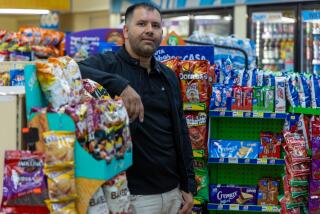56 Refugees, Mostly Kin, Pack 2 Houses
SKOPJE, Macedonia — Ismail Samakova may have set a record for hospitality.
Thousands of Macedonian Albanians have opened their doors to their ethnic brothers and sisters who have been forced out of neighboring Kosovo by Serbian forces. But it is difficult to imagine that anyone has opened his doors wider than Samakova has.
He has welcomed 56 refugees--mostly relatives, however distant--across the threshold of the modest compound that he already shared with his two younger brothers and their families in a poor neighborhood of Skopje, Macedonia’s capital.
Samakova shrugged when asked about his generosity and nonchalantly mentioned that he was expecting 24 more refugees, distant relatives. He hopes they are in the long line of refugees backed up on the Yugoslav side of the border waiting to get out.
“I will gladly even accept more refugees,” said Samakova, who has people sleeping on most of the floor space in the two-house compound with a concrete courtyard. “It’s better to be in any house--even a crowded one--than to be under the open sky.”
International relief agencies are counting on the hospitality of people like Samakova to offer shelter to many of the 70,000 ethnic Albanians who have crossed into tiny Macedonia since NATO’s airstrike campaign began last week, as well as to the tens of thousands more who are expected in coming days.
The members of the Macedonian Albanian community are much more willing than most others in the modern world to open their homes to relatives and strangers in need, said Kris Janowski, spokesman for the Office of the U.N. High Commissioner for Refugees, which is heading the international relief effort here. The people of Albania, where even more refugees from Kosovo have ended up in recent days, have exhibited similar selfless hospitality.
“It’s amazing,” Janowski said. “You see that kind of attitude only in Africa. This kind of attitude in Europe is almost extinct.
“The local Albanian leaders insist they want to do this,” he said. “But the Macedonian government is quite nervous about it. They don’t want to change the population structure.”
About 23% of Macedonia’s 2 million people are ethnic Albanian. The Macedonian government is accepting the refugees, but it requires them to register, which in recent days has kept tens of thousands of people of all ages exposed to the elements for at least 24 hours while they wait in a huge crowd at the border.
Many ethnic Macedonians, who make up the majority of the population, are not shy about expressing their reluctance to see the Albanian population grow--even temporarily. Non-Albanian Macedonians do not appear to be taking in Albanian refugees from Kosovo in any significant numbers, international aid workers said.
But Samakova has been too busy watching over his outsize household by day and doing his factory job by night to worry about the sentiments of people in other neighborhoods of Skopje.
On Friday afternoon, his courtyard was strung with multiple clotheslines. Scores of tiny sweaters, T-shirts, slacks and underpants were hanging to dry in the intermittent sunshine. Rugs and cushions lined the floors of all six rooms of a year-old concrete house, where men, women and children all sleep side by side. More refugees helped fill up the 30-year-old main house, where the 13 permanent members of the household also sleep.
To sustain the crowd, the women prepare massive quantities of food in three cooking areas. Samakova says they use 50 pounds of flour a day to bake their own bread. A local relief agency, El Hilal, whose name means “New Moon,” has supplied them with some food. But Samakova, who works at a construction materials factory, is clearly bearing quite a financial burden.
The refugees, most of them Samakova’s cousins or uncles, were forced from two villages in Kosovo not far from the border with Macedonia.
Serbian soldiers were burning some of their animals alive, had set fire to their houses and warned them that they would be killed if they did not flee. The adults walked seven or eight hours over hilly terrain carrying children in their arms to reach safety.
“It is very painful when you have to leave your land and all your possessions behind and become a refugee,” said Qamil Samakova, 45, an uncle of the host who left behind a farm in Kacanik, Kosovo. “There has never before been a spring when I did not till my soil and plant my crops.”
The refugees have massed at Samakova’s home over the last two weeks. The older children attend local school, but the adults are not permitted to work. The 20 or so younger children and the household chores keep the women busy. But the men are restless. And, accustomed to the space and freedom of the countryside, the children are fidgety and cranky in their confined concrete world.
“The kids are very bored here. They are always crying,” Xhevahire Samakova, 25, said as she washed toddler-sized clothes in a plastic tub with a bar of soap.
There were no toys in sight.
A 17-year-old girl--who left her mother, father and brother behind and is worried about their fate--was not shy about exposing the bleak aspects of refugee life.
“It’s noisy to sleep with so many other people,” said Tevide Ferati.
Despite the cramped quarters and the financial strain, Samakova appeared to take some pleasure out of being the host.
But when he was asked if he wished there was a refugee center to house all these people, a wistful look quickly flashed across his face, and he said, “It would be nice if there were a center.”
*
A list of charities accepting contributions to help refugees from Kosovo may be found at http://ukobiw.net/kosovoaid.
More to Read
Sign up for Essential California
The most important California stories and recommendations in your inbox every morning.
You may occasionally receive promotional content from the Los Angeles Times.










